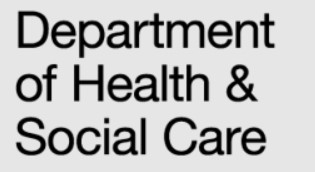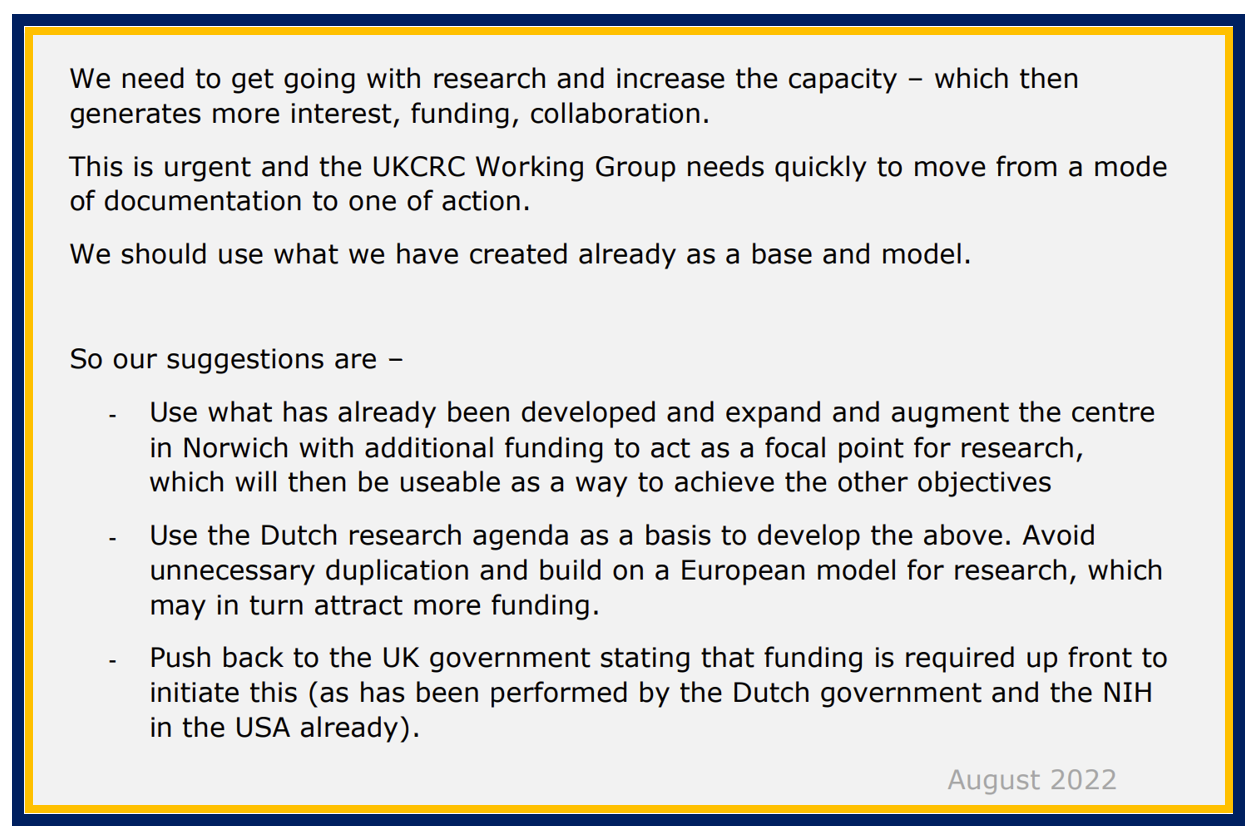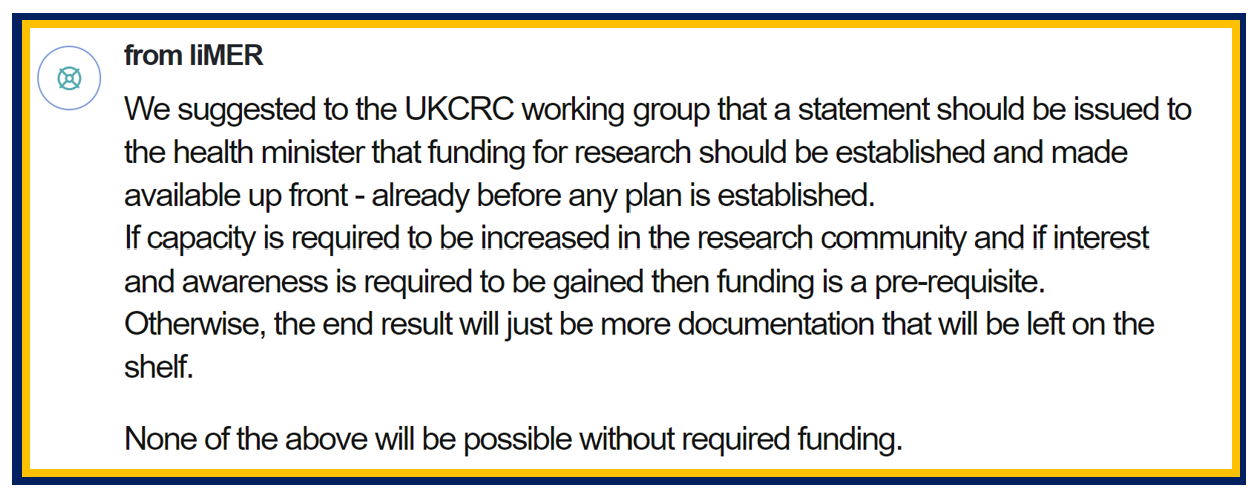Suffolkres
Senior Member (Voting Rights)
Utterly brilliant writing... in the vein if Private Eye!
Utterly brilliant writing... in the vein if Private Eye!
Utterly brilliant writing... in the vein if Private Eye!
https://www.investinme.org/ukcrc-input05.shtmlME/CFS Research Working Group Meeting - November 2023
This document carries comment from UK charity Invest in ME Research (IiMER) with the recent meeting of the ME/CFS Research Working Group held on 24 November 2023
This article is also available here -

Recap
Latest Meeting

- We requested public release of the research working group meeting minutes in our first meeting in September 2022 submission [2], but the request was denied. Consequently, we opted to document our involvement to provide some transparency [4].
- In our September 2022 submission to the research working group [2], we emphasised the quickest and most effective pathway for change in the ME research environment that would expedite research and discovery for ME. We advocated leveraging existing resources, especially the centre of excellence being founded in Norwich Research Park, and adopting a well-established Dutch research plan that involved patient consultation, potentially merging it with a UK research agenda.
- We emphasised the need for the group to push back promptly to the government, asserting that any progress hinged on securing funding for the proposed developments.
- Our document was not distributed or discussed, despite our request to the secretariat. The issue was raised again in early 2023 by another member, but uncertainty remains about its full distribution and discussion. Nonetheless, we promptly made it available on our website and social media [3].
- We summarised with this paragraph –

- In the October 2022 meeting -

- Since then we have participated in some of the discussions frustrated that nothing much is being achieved (4).
- The sole tangible outcome appears to be the DHSC Interim Delivery Plan report, yet offering little new information. While some proposed actions are welcome, their impact hinges on swift and earnest implementation rather than mere suggestion.
- More delay while this survey is analysed - Urgency still not a priority overall and still no sign of any funding forthcoming specifically for research into ME
- The existing research centre in Norwich Research Park has not been recognised and its potential for rapid progress in research is therefore lost, with further delays to progress
- There now seems to be an intent to supply a set of recommendations for research by May 2024 - and no knowledge of what will definitely be implemented, what the content of planned education and information will include, and no definite research strategy being funded
- Eighteen months have passed since Secretary of State for Health Javid's announcement with nothing yet achieved that can be termed a change for people with ME
On 24 November 2023, we participated in an update meeting of the research working group where we heard that recommendations would be formed to be put to DHSC by May 2024, based on what had transpired in meetings up to that point, and any actions that had been taken.
This will have been the output from two years of discussions.
We passed these comments -

- We did not believe and had no confidence in this plan achieving anything
- We stated that we thought recommendations would just be another document that would achieve nothing and, with a pending election becoming imminent, the recommendations would be subject to whatever government was elected and the policies and decisions it pursued.
- We argued that passing recommendations without immediate funding allocation would maintain the current situation. Researchers would likely receive small, piecemeal funding through individual applications, potentially favoring only a select group of researchers.
- We also said that it was still at the mercy of MRC peer reviewing – and we all knew how suspect that has been for ME over the years.
- Just repeating the current situation with a few more web site pages updated, a dusting off of the eleven-year-old highlight notice and a few more documents to be added would achieve nothing.
- We reaffirmed our view that the document we submitted back in September 2022 in the first meeting to which the charity had been invited was still, in our view, the best way forward. These contained three recommendations –
- - Use what has already been developed and expand and augment the centre in Norwich with additional funding to act as a focal point for research, which will then be useable as a way to achieve the other objectives
- - Use the Dutch research agenda as a basis to develop the above. Avoid unnecessary duplication and build on a European model for research, which may in turn attract more funding.
- - Push back to the UK government stating that funding is required up front to initiate this (as has been performed by the Dutch government and the NIH in the USA already)
- We stated that we have the centre already firmly founded in Norwich Research Park with research at Quadram Institute and UEA, a university and university hospital collaborating, an ME clinic with clinicians and physios already involved, with more funding and research on its way; that we have European and international collaboration already formed with European ME Research Group and a European young/early career researcher network and clinicians group formed. We hold annual research colloquiums with researchers from around the world. Therefore, foundations were already in place and operating – with only funding required.
- All of this has been ignored.
- We believe that the Norwich Research Park environment with Quadram Institute and UEA offers the best location, the most expeditious pathway for progress in research and building of capacity and awareness, and the best value for (limited) funding to develop further the centre of excellence.
Yet our views have been overlooked. Why would that be?
So we suggested a collaborative approach, urging other represented research locations to join forces with the existing Norwich centre to create a comprehensive funding proposal for multiple centres of Excellence for ME.- We also stated that the MRC highlight notice (that had been present for eleven years) was ineffective and useless, despite some comment in the group seemingly believing that it would achieve something.
The APPG for ME now recognises the necessity and benefits of the Centre of Excellence for ME.
Others are finally acknowledging the concept, even disingenuously adopting the term for their own purposes, despite never supporting our proposal for the Norwich centre since our work began in 2011.
While always hopeful, we remain skeptical of the DHSC initiative's progress over the past eighteen months, disappointed at the lack of urgency and vision for real progress.
We have provided feedback on the interim survey plan [4], but actual action seems further delayed.
We await developments following our expressed views in the meeting.
Is there something new in this?
- 21 May 2024
Added a summary of responses to the consultation.
- 4 September 2023
First published.
HTML version
https://www.gov.uk/government/consu...delivery-plan#full-publication-update-history
East to read version
https://www.gov.uk/government/consu...cfs-easy-read#full-publication-update-history
Detail of feedback received
The Department of Health and Social Care is grateful for stakeholders’ engagement on this topic.
The consultation received 3,338 responses. Of these:
Most organisations that responded were from the voluntary or third sector. We also received responses from organisations in the public and private sectors, as well as other professional bodies and organisations.
- 3,113 were from individuals sharing their personal views
- 125 were from individuals sharing their professional views
- 53 were from individuals responding on behalf of someone else
- 47 were from organisations
Due to the high number of respondents and the high number of qualitative questions in the consultation, it is taking longer than expected to analyse all the feedback.
We will publish the government response as soon as possible. The final delivery plan will be published in due course after the consultation response.
Just come across the following - one institute this one based at university of reading but with funding from charitable sources too (Charlie Waller Institute) which is specifically about ‘evidence-based mental health’
https://sites.reading.ac.uk/charlie...ma-in-evidence-based-psychological-treatment/
it has been appointed to provide training for IAPTS since 2008: https://sites.reading.ac.uk/charlie-waller-institute/training/iapt-training/
I applaud the intention of the Charlie Waller Trust with regard improving provision for mental health: https://sites.reading.ac.uk/charlie-waller-institute/about/
I have no idea how many other training areas there are in the country but note this one trains large numbers to do CBT (suspect most aren’t self-funders -fir which I haven’t checked the course yet but don’t know) and also seems to have a lot of speakers and trainers for schools.
I also sadly found a talk for Oct 2020 given by Chalder at the institute, noting this is pre- 2021 guideline but still knowledge certainly wasn’t at that point such that people weren’t aware the old premises snd people weren’t sn issue so worth checking etc.
Anyway my point is that do we need a psych for ME group who are enabled by the patient community then backed by eg ForwardME to start requiring that where such courses that do output hundreds of new therapist a year of talk to schools etc have the correct information on MAr/CFS and all old ‘myths’ are banished - whether they want to change the term to ‘chronic fatigue’ for good or cynical reasons they will be aware that this snd just the ‘long term conditions’ concept + old misinformation in training requires that updates to old knowledge need to be being put out by places like this to both new students and their alumni
and yes if people do end up needing support if they get additional comorbidities in these areas they need their illness to be understood and not have a ‘bigotry barrier’ harming them and preventing them access to treatment for those ?
Our current Board Advisors are:
- Professor David Clark
- Lord Crisp KCB
- Professor Andrew Reeves
- Lord Layard
- Dr Denise Meyer
- Professor Suzanna Rose
- Sir Anthony Seldon
- Professor Sir Simon Wessely
- Professor Roz Shafran
- John Olsen
[previously noting she has spent 3yrs serving on the ME/CFS guidelines] That experience has been behind the push to make sure that there is compliance. My proposed amendment would be a way of assessing compliance with the guidelines as predetermined and set out in the NHS mandate. The mandate could select a few that would act as proxy markers across the piece and include a date line, so that their implementation across the country could be benchmarked. It would not increase the workload, because it could draw on existing sources of data in the NHS. As the Minister has said, data is our key to understanding and unlocking things.
The proposal is to give the CQC the powers routinely to address the adherence to guidelines—that would be specified by the NHS mandate, so a national standard could be set—and introduce a reporting metric using current data sources as a starting point to establish a benchmark. I want to stress, as I know does my noble friend Lord Patel, that we are not advocating for guidelines to be mandatory—that would not be right, because each patient is different and individual—but we are asking for a system to be introduced that gives powers so that there can be scrutiny of whether the guidelines are being adopted, because their adoption would narrow the gap in inequalities. We both feel that we need to commit to address this in this important legislation, because it is a way of achieving tangible action to ensure equity in access to quality in healthcare.
My question to the noble Baroness, Lady Finlay of Llandaff, is: if she thinks that is not sufficient, how much further should the CQC actually go in adopting quality standards? At the moment, it has compromised and said, “We will take the essential steps, because those are a few, generally about five, specific things that we can look at to see whether they are being done, in which case, okay; or are they not being done, in which case it clearly needs improvement, or may not be meeting the standard.”
The noble Lord asked me a question to which I feel obliged to try to respond, but I really want to answer the question with a question: does the CQC have enough powers to benchmark as it would want to do, and to publish those benchmarks? I hear the concerns of my noble friend Lord Stevens in relation to fear of litigation and how that is an objection to the amendments, but I am also quite worried that that is potentially a way of avoiding adopting the guidelines themselves, thereby inhibiting a change in practice and a move to best practice.
While there are sources of information that those who are very health-literate, IT-literate, and so on, can access to establish their own benchmarks about what is happening, many people, particularly those in the most deprived areas of the UK, do not have any knowledge of even where to begin looking for these things. That was the motivation behind the amendment: to try to make sure that in the poorest and most deprived areas, people would still be able to access this. That would drive up standards gently but would not create a mandated requirement that a NICE guideline is adopted, for the reasons I outlined previously.
In winter 2024/5 so likely February next year.Confirmation the Delivery plan will be finalised and published.
https://questions-statements.parliament.uk/written-questions/detail/2024-07-29/HL454
Im re reading this through and quite tired at the moment.Has anyone already posted this speech from Baroness Findlay of Llandlaff in the debate on 7th Dec 2021?
Baroness Finlay of Llandaff - Health and Care Act 2022 contributions (parallelparliament.co.uk)
If you search on the term CFS then it takes to the section I've just read through. And there are a few interesting paragraphs. Talking about benchmarking by the CQC etc.
Apologies if this is off-context, bitty (I'm using limited brainpower) and if everyone already knows much of what is discussed. I know things have moved on somewhat with the implementation too.
It includes the para (which I hope hasn't been taken out of context, and if someone let's me know if it is OK to copy paste the whole part, might be better as some is 'general' and others CFS specific so it is hard not to misadvertently put things out of context):
then paragraphs on diabetes, Chrohns and issues such as biologics. with the final para:
there is then a question from LOrd Lansley to her:
And her response:
Nicky Proctor tweet said:Are you able to say who is involved in a) writing and b) reviewing these modules Katie? Concerning that well-informed @PhysiosForME and @StripyLightCIC Both requested involvement but denied. Who @NHSEngland could possibly be influencing this one wonders?
Katie Johnstone tweet said:They're being written by Dr David Strain. I'm not sure about the reviewing, I think there is some sort of internal NHS review process. I agree it's extremely concerning that people with expertise were not invited!
Thanks.
If we on the working groups have no idea, things don't seem to look too promising.
I feel as if a huge team of people with all sorts of skills has been brought together to dig for buried treasure but since nobody had a map they may have dug a hole in the wrong place.
I was one of the working groups for the delivery plan. Most of what I saw near the end of the process was really good. (With the understanding that there are always going to be some things I’d prefer worded another way).
So I wonder if the problem is not the process by which the information was collated, but rather that the patient voice ended up being heard, and that someone somewhere has not appreciated that and put obstacles in the way?
